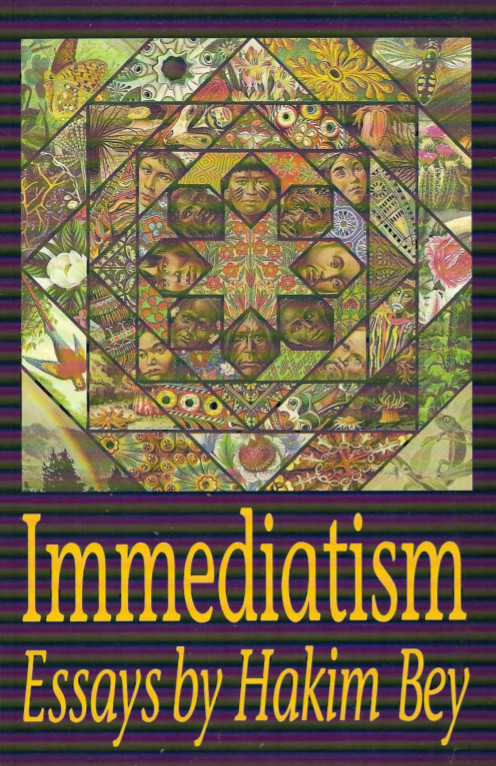Hakim Bey: Immediatism (1992/1994)
Filed under book | Tags: · anarchism, art, desire, ontology, politics

“In this collection of essays, the insurrectionist theoretician Hakim Bey expounds upon his ideas concerning radical social reorganization and the liberation of desire. Immediatism is another lyrical romp through intellectual corridors of spirituality and politics originally set forth in his groundbreaking book, TAZ.”
First published as Radio Sermonettes by Libertarian Book Club, New York, 1992
Graphics by Freddie Baer
Publisher AK Press, Edinburgh/San Francisco, 1994
ISBN 1873176422, 9781873176429
Anti-copyright, the book may be freely pirated and quoted
59 pages
Laurier Rochon: The Dictator’s Practical Internet Guide to Power Retention (2012)
Filed under booklet | Tags: · internet, politics, power, social media, totalitarianism

The goal of this guide is to provide leaders of authoritarian, autocratic, theocratic, totalitarian and other single-leader or single-party regimes with a basic set of guidelines on how to use the internet to ensure you retain the most power for the longest time. The best way to achieve this is to never have your authority contested. This guide will accompany you in the obliteration of political dissidence. By having everyone agree with you, or believe that everyone agrees with you, your stay at the head of state will be long and prosperous.
Self-published, June 2012, Rotterdam, The Netherlands
55 pages
PDF
View online (HTML)
Daniel Kreiss: Taking Our Country Back? Political Consultants and the Crafting of Networked Politics from Howard Dean to Barack Obama (2010)
Filed under thesis | Tags: · internet, networked politics, networks, politics, social movements, united states
While many scholars argue that the falling cost of producing and disseminating digital information drives new forms of collective political action, this dissertation reveals how digital tools, practices, and cultural processes together shape electoral campaigning. In the process, this research shows that digital technologies are not the primary drivers of changes in political practice and networked politics is not as radically democratic as many scholars suggest. Through open-ended interviews, archival research, and participant observation this work shows how until the 2003-2004 presidential election political consultants used the Internet as mass medium. During the Howard Dean campaign, however, consultants deployed a set of Internet applications that enabled citizens to work together on tasks such as voter mobilization and fundraising. As these new media staffers drew from their corporate experience to build these tools they described the campaign as a technologically-empowered, 1960s-style social movement. The dissertation concludes by showing how after the campaign these staffers founded political consultancies and brought these tools, techniques, and claims to many other sites in electoral politics, including Barack Obama’s bid for the presidency. While telling this history, this dissertation shows how social formations and cultural work together shape the uptake of tools in electoral campaigning. Meanwhile, in contrast to many accounts of democratizing ‘Web 2.0’ technologies, this dissertation reveals that digital media vastly extend the power of campaign consultants to motivate, channel, and control electoral work.
Dissertation
Department of Communication, Stanford University, 2010
251 pages
The thesis was later published as a book, author, publisher
Comment (0)
